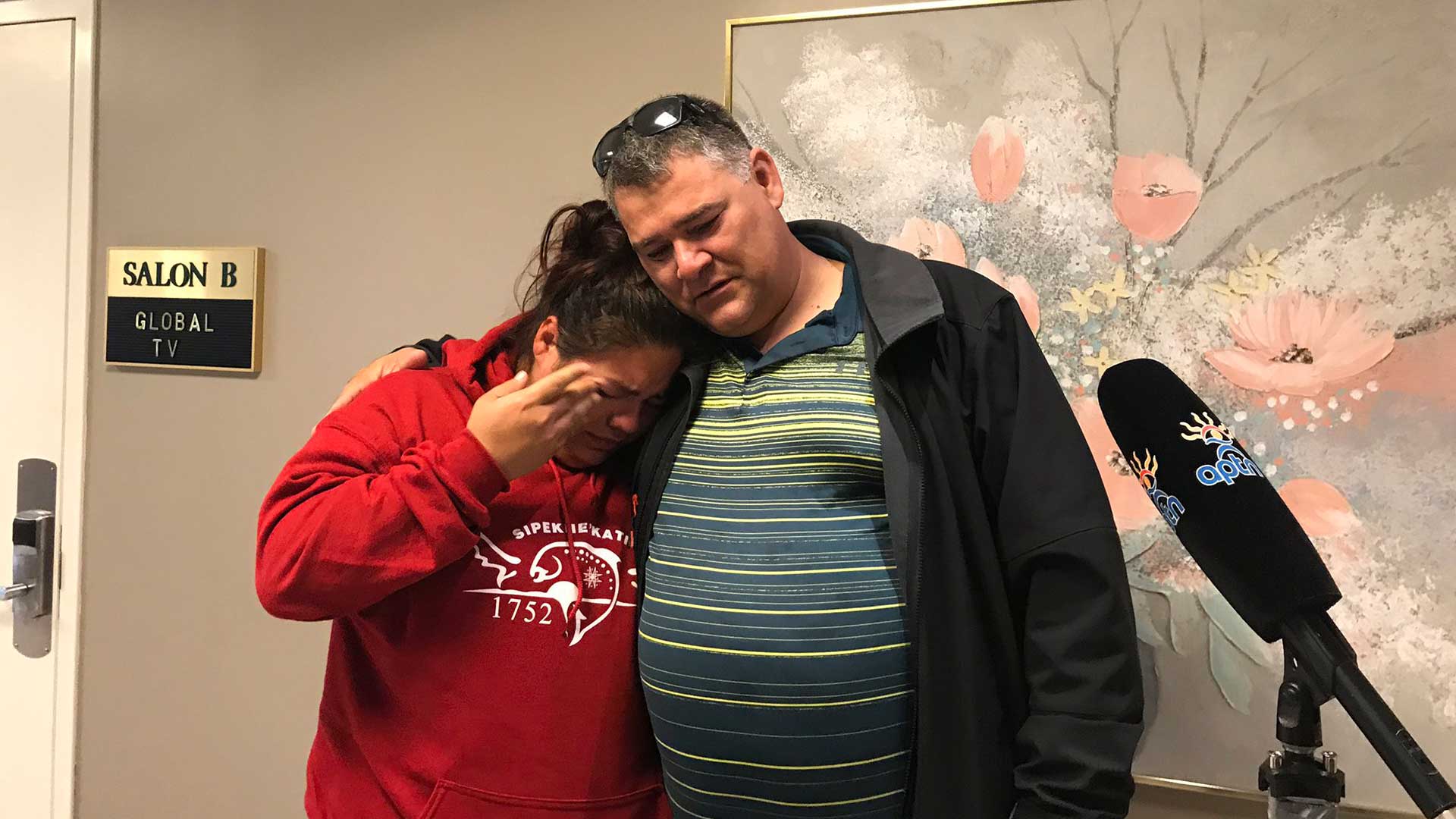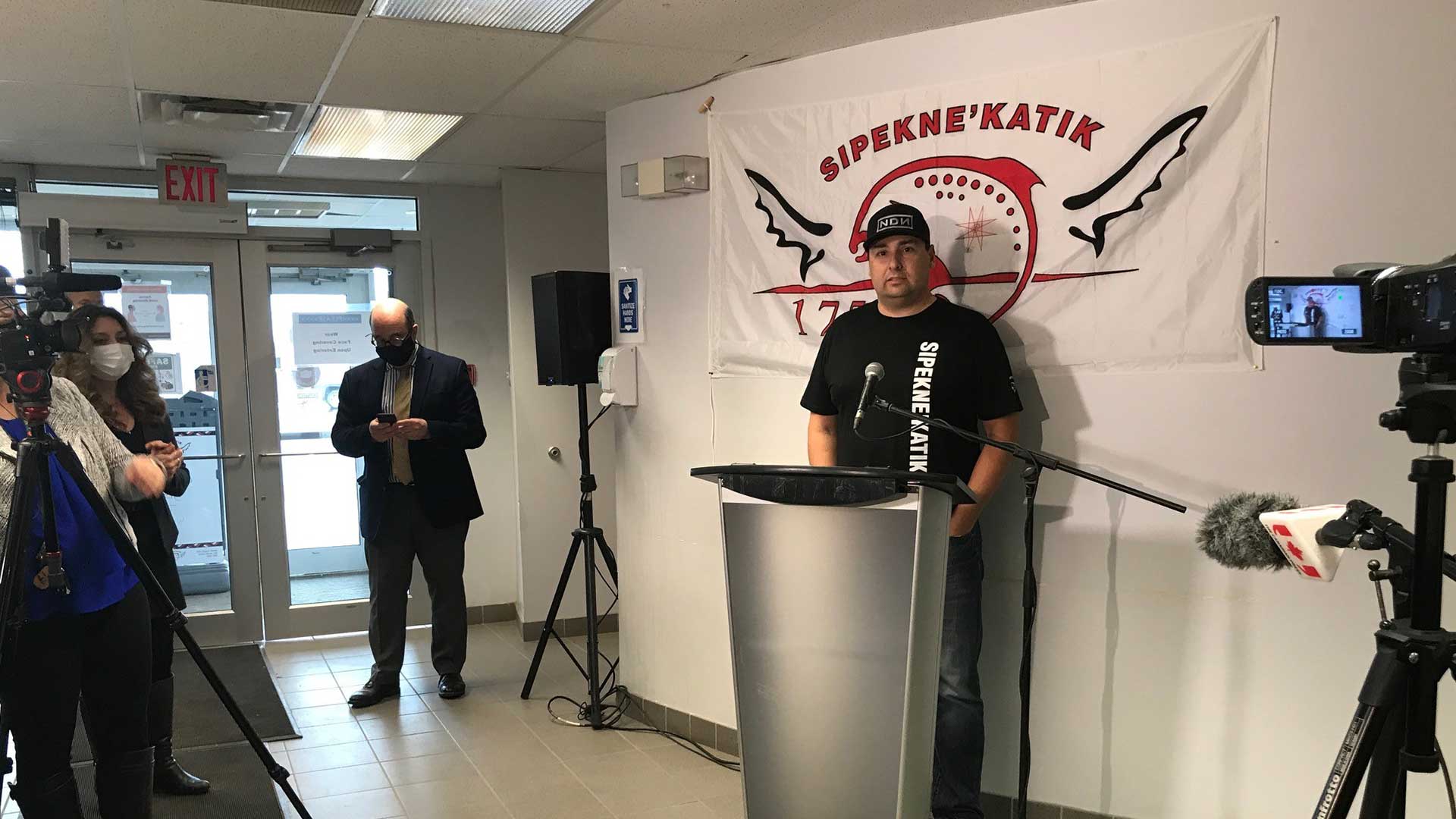Mi’kmaw lobster fishers who were blockaded, attacked and assaulted while exercising a treaty right to harvest lobster late last year say internal Department of Fisheries and Oceans (DFO) documents expose systemic racism in the bureaucracy and preferential policing by law enforcement.
APTN News obtained hundreds of internal records that reveal public servants and law enforcement agencies knew potentially violent protests against the Mi’kmaq were coming, yet did little to intervene.
“That’s pretty unnerving. It’s even more unnerving to know those documents exist,” said Jason Marr, a lobster harvester with Sipekne’katik First Nation.
Marr broadcast tense video over Facebook while he was barricaded inside a West Pubnico, N.S., lobster storage facility on Oct. 17, 2020.

An angry mob of commercial fishers were raiding the building. They trashed Marr’s van and stole his lobsters.
The RCMP were widely panned for standing by while the rampage unfolded. They were easy to identify in their yellow reflector vests.
“They allowed it to happen,” said Marr. “I believe they’ll continue to allow it to happen. If we were there tomorrow, they’d be there. They wouldn’t come and stop it. It would be the same thing again.”
The building was burned to the ground after Marr was escorted out.
A month before that, on Sept. 19, Coast Guard threat assessors identified the risk of protests turning violent as “likely.”
Intelligence was being shared between different federal agencies through the Marine Security Operations Centre – East (MSOC-E). MSOCs are interdepartmental marine security nerve centres operating under Transport Canada.
Late on Sept. 17, a DFO MSOC account emailed a dangerous occurrence report to several addresses at the Defence Department, RCMP, DFO, the Canadian Border Services Agency and Transport Canada.
Marr suggests these agencies should bear responsibility for failing to uphold safety on the sea.
“It wasn’t just fisheries things they ignored. There was many Transport Canada violations,” he said.
“If you seen 200 boats in that small of an area on any given day – I don’t care if they were motor boats or Sea-Doos – you would see Transport Canada coming to see why they were there.”
He called the failure “unbelievable.”
“That’s something you would think would happen back in the ’50s,” said Marr. “It’s racism at its finest. It ain’t going to go away. That’ll never go away.”

Sipekne’katik Chief Mike Sack agreed.
“They definitely did fail our people. Maybe the joke is on us for expecting anything different. It’s happening over and over again,” he said in an interview.
Sack had been asking the province, feds and law enforcement to step up and protect his harvesters.
He wrote them a letter on Sept. 11 warning them of what was coming.
He told APTN the documents confirm what was obvious at the time.
Read More:
DFO, RCMP knew violence was coming but did nothing to protect Mi’kmaw lobster harvesters: Documents
“The RCMP were reaching out to DFO, and DFO wouldn’t even return their calls. So, internally, the left hand don’t know what the right hand is doing,” he said.
“We reached out to the minister, and we spoke about things that were going on on the ground. They were like, ‘No, DFO’s in the area. They’re on the water.’ And we’re standing on the wharf – and there’s no DFO.”
The records, which were released via access to information request, include multiple situation reports, or SITREPs. They laid out new developments twice per day.
The SITREPs reveal fishery officers never lost sight of their objective. They aimed to enforce the Fisheries Act against anyone fishing without a DFO-issued licence.
But senior DFO law enforcement officials told their officers to “observe, record and report” because the situation was too dangerous.
A Conservation and Protection director, Todd Somerville, defended the decision in an email.
DFO also viewed gear destroying as an issue for the RCMP. But the SITREPs show the RCMP were vastly under-resourced. On Sept. 18, they had only one zodiac on the water compared with 200 commercial ships.
Meanwhile, Coast Guard vessels and aircraft wouldn’t arrive in full force until Sept. 19, two days after the flare shooting and floating night blockade.
Sack issued a statement accusing law enforcement of being “complicit” in the violent attacks on his people shortly after APTN’s report.
“The inequity and systemic racism which is exposed in this report by APTN is sadly not surprising but still disturbing on many levels,” said the statement.
“These institutions that are sworn to serve and protect all people have now been revealed as serving and protecting only some or rather their own as we were left to fend for ourselves.”
APTN requested interviews with RCMP Commissioner Brenda Lucki, Public Safety Minister Bill Blair and Fisheries Minister Bernadette Jordan.
They all declined. Jordan’s office sent us a prepared statement instead that didn’t address the issues raised in our report.
It said extra Mounties and the Coast Guard were brought in to respond to the standoff in southwestern Nova Scotia, with 25 charges since laid.
“From the beginning we have been clear: the Mi’kmaw have a supreme-court affirmed Treaty Right to fish in pursuit of a moderate livelihood.”
-With files from Angel Moore










